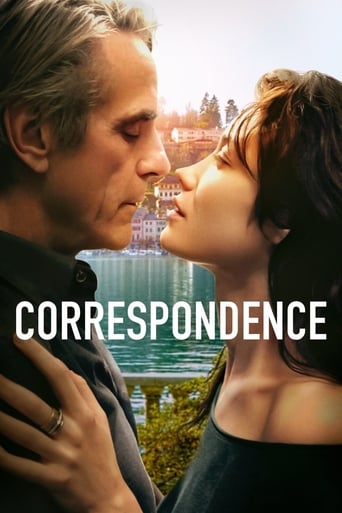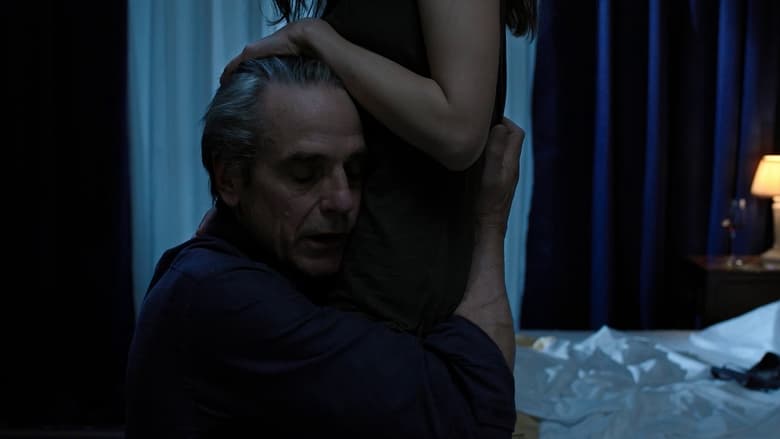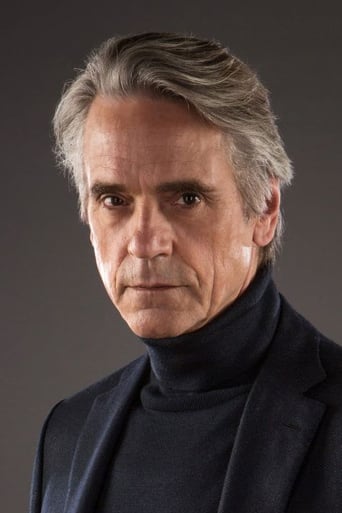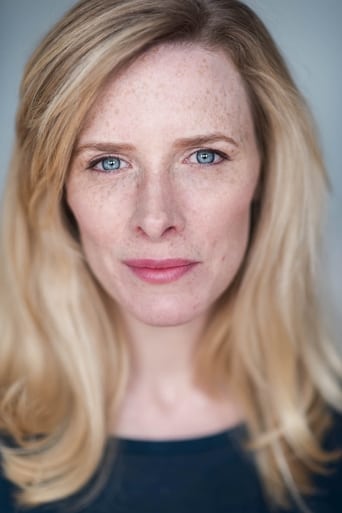

Correspondence (2016)
The relationship between Ed, a married astronomer and Amy, his lover, who spend their years apart, is based only on phone calls and texts. One day Amy begins noticing something strange in Ed's messages.
Watch Trailer
Cast
Reviews
The Age of Commercialism
Boring
There is, somehow, an interesting story here, as well as some good acting. There are also some good scenes
Actress is magnificent and exudes a hypnotic screen presence in this affecting drama.
Ed Phoerum (Jeremy Irons) is a renowned astrophysicist having a six year affair with a student Amy Ryan (Olga Kurylenko) who is also an actress/stunt woman. The opening scene was rather drippy which sets up for the cheesy love scenes that will make it impossible for couples to have normal relationships after watching this film. Knowing he is dying, Ed sets up for text messages, letters, and recorded DVDs to be sent to Amy from beyond the grave. Ed was very astute and knew Amy's schedule and her too.One of the discussions is String Theory which includes parallel and alternate universes from which we can have some sort on immortality of be able to communicate with each other. Amy realizes Ed lives on his her life as a dead star whose remnant we still see.This is not a film for everyone and requires a hopeless romantic with a little bit of a geek background. It is way too long at 2 hours as the Ed run around grew tiresome.Guide: F-word and nudity (Olga Kurylenko)
Writer/Director Giuseppe Tornatore ('Cinema Paradiso', 'The Legend of 1900', 'The Best Offer', 'Everybody's Fine') has created a love song to Italy, science, astronomy, writing as an art form, communication and that fragile love between an older professor and a student. In other's hands this combination may come saccharine and a silly treatise on life and whether we die or become part of the universe spirit. Tornatore makes it a sensitive and delicate poem of a film.Amy Ryan (Olga Kurylenko), a young student and stunt woman for films and Ed Phoerum (Jeremy Irons), a highly respected astrophysicist have an affair for 6 years, primarily an affair over distance. When Ed goes out of town, both of them keep in touch by text and video chats. All seems well and carries a light touch of humor as well as longing until Amy discovers Ed died 2 days back due to cancer. But still she receives messages and gifts under the name of Ed. Amy meets Ed's family (Shauna Macdonald, Oscar Sanders) and gradually assimilates with them. She ceases to feel lonely with the frequent input of videos she receives at strange intervals but remains surprised about the mysterious messages and gifts. How Amy copes with her life and how is Ed texting and sending gifts even after his death forms is brought to a satisfying if over long conclusion to the film. Ed suggests that she will find another man and very briefly in the end Amy encounters an old acquaintance Jason (Simon Anthon Johns), suggesting that Ed's last prediction will be fulfilled. Tornatore's writing includes some wonderful information about the stars and the theories of their life span as well as other Astronomical insights and mixes these with love poems that are radiant as delivered by both Irons and Kurylenko. Though the film opens with a passionate love scene we both hear in darkness and eventually see as the film progresses, the remainder of the film is a conversation via cell phone and video and for those of us who have problems with the obsession with those forms of interaction in today's society, Tornatore manages to soften the mechanical emptiness of their use.Ennio Morricone provides the musical score and Fabio Zamarion the exquisite photography of Italy, Scotland, and the UK. The film is in need of some editing but the spirit is there and Tornatore's little gem restores our faith that fine films are still being made.
Focused on the relationship between an astronomer and his lover, who spend their years apart. If you take out Olga Kurylenko's and Jeremy Irons great performances, the stunt works sequences and the 2 great scenes of Amy getting closer with a dog that she just met the whole rest of the film is divided between a very boring plot and pacing and thousands of scenes where we see her standing in front of a computer or a phone texting or just watching old videos with Irons in it. This film had a simple premise but it failed to deliver it cause we spend way too much time in cellphones and computer messages and although the 2 leading actors did a great job is not enough for them to save a boring mess. (4.5/10)
What do you need in order to create a movie in the inverted order from the usual story line: the one that starts with the line "From death do us part" and ends with the line "They lived happily ever after"? The answer is simple: You need a mastermind like Giuseppe Tornatore. A mind capable of inventing such interesting story, told through inspirational dialogues and intriguing plot. The final product entitled "The Correspondence" is equally impressive as an independent piece of art, as well as a juxtaposing part of Tornatore's previous movie "The Best Offer". The beauty of comparing his recent films (written in English) lies in the opportunity to grasp the big picture. Both movies revolve around couples and involve prototypical males (rational yet highly emotional, thus men in touch with their feminine side) and prototypical females (fragile yet strong, thus women in touch with their masculine side). Both have impressive cast for the role of the men (Jeremy Irons / Geoffrey Rush) and expressive cast for the role of the women (Olga Kurylenko /Sylvia Hoeks). "The Best Offer" deals with the mysterious appearance of the female character, while "The Correspondence" seals the deal with the mysterious disappearance of the male character. The first speaks about losing oneself when finding the significant other, while the second movie speaks about finding oneself while losing the significant other.Indeed, the theme of loss is ever-present in each frame and pixel of "The Correspondence". Someone might wonder if something so void and devoid of any words, something as ineffable as loss could ever be explained through words? It can and it ought to be, since the communication is the purest form of connection between a man and a woman, a marriage of their ideas, an ideal in itself, an open door to the deepest human connection. As long as we perceive the words spoken outside of our heads (in the books, songs or mouths of other people) as coded messages from the loved one, and as long we use all words existing inside of our heads as messages for our loved one, there will be connection. As such, the words are symbol of focus, of attention, and constant (re)invention of the significant other. Their presence signifies life, their absence – death (even in a symbolic manner) of the other.Within this movie, the characters use words to reach to one another, somewhere, anywhere. With this movie the director uses words, to hopefully reach toward each one of us, everywhere. With this review, I use words, maybe also to reach to someone, somewhere, out there Biljana Gjoneska www.evermind.me


